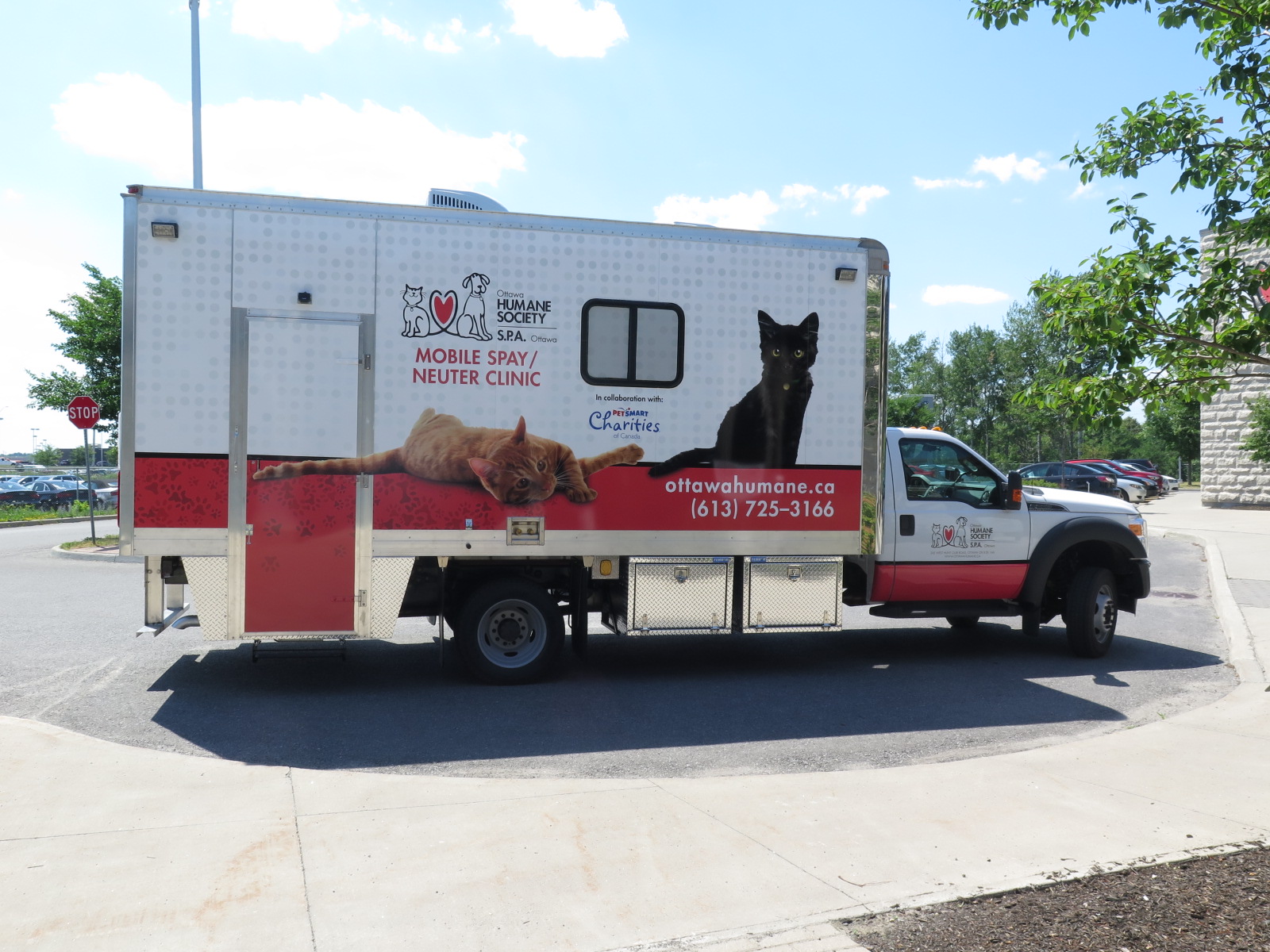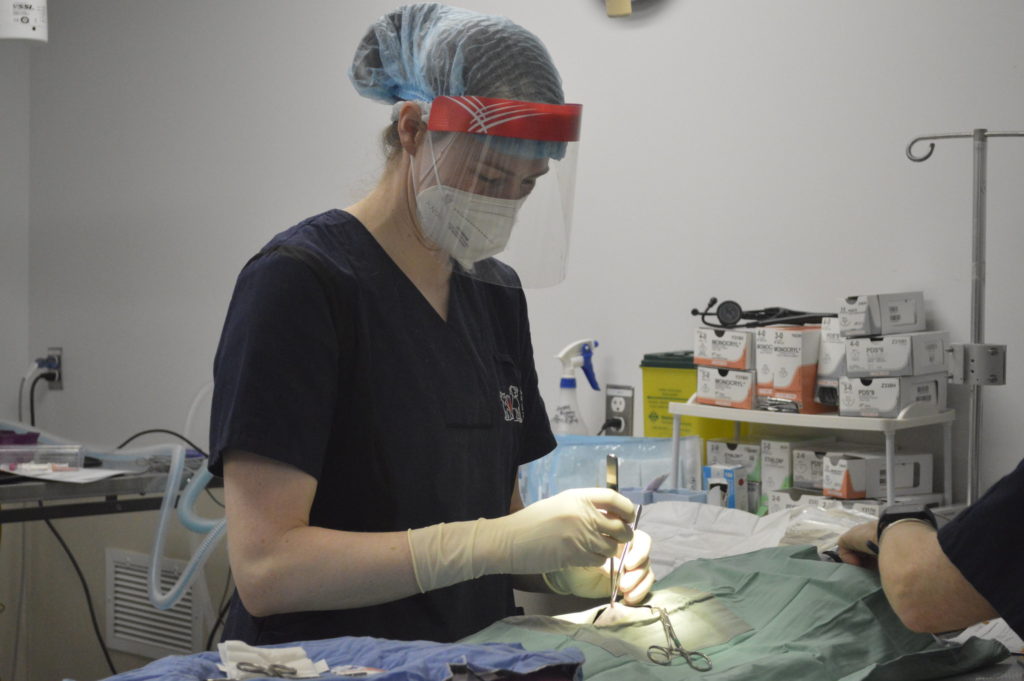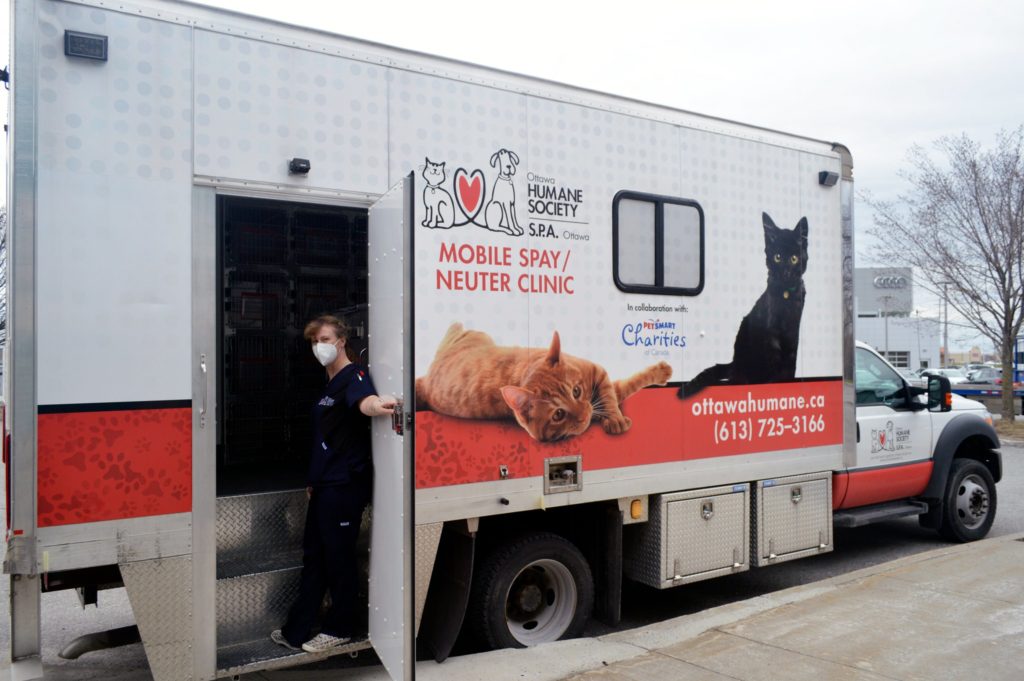Search Results for: mobile spay neuter clinic
Mobile Spay/Neuter Services
We are accepting a limited number of cats for spay/neuter at the Ottawa Humane Society Animal Clinic located at 245 West Hunt Club Rd, while our vehicle is off the road for maintenance.
Please read through the information below before requesting an appointment.
Spay/Neuter Stand-By Appointments
We are now offering a limited number of spay/neuter stand-by appointments. A stand-by appointment means that you would come for morning registration between 8 and 8:15 a.m. with your cat ready for surgery that day. Once we have admitted all booked appointments, we will let you know if there is space available for your cat.
There is no guarantee that your cat will have surgery that day. We prioritize stand-by appointments on a first-come-first-serve basis, on the morning of the surgery.
You must submit an appointment request to be eligible for a stand-by appointment.
Appointments will open up for Stand-By on the same schedule as regular appointments.
What is the OHS Mobile Spay/Neuter Clinic?
The OHS Mobile Spay/Neuter Clinic is a mobile veterinary spay/neuter clinic that provides subsidized feline spay/neuter surgeries for low-income pet owners in Ottawa.
Our main goal is to address the problem of cat overpopulation in Ottawa. A second goal is to help preserve the human-animal bond by providing a service to help pets stay with their owners, rather than be surrendered to the OHS.
Qualifying for our services:
In order to qualify for services from the OHS Mobile Spay/Neuter Clinic, clients must live within the City of Ottawa boundaries and meet one or more of the following requirements:
- Enrolment in ODSP or Ontario Works
- Enrolment in the Resettlement Assistance Program
- Receive the Guaranteed Income Supplement (for seniors)
- Annual Income below $30,000 (approximately $15 per hour; Notice of Assessment required)
- Letter or referral from a social worker, social service agency, or qualified City of Ottawa employee
Cats must be at least 4 months of age and no older than 8 years of age, and in good general health.
Cost of our services:
We provide subsidized spay/neuter services for $60 per cat. This price includes a microchip if you are interested in getting one for your cat. We also provide complimentary nail trimming and ear cleaning (if needed).
About our clinics:
Clients arrive with their cats at 8 a.m. for registration and arrive to pick up their cats at 3 p.m. that same day!
Request an Appointment
Once we confirm your appointment, you will receive an email with all the instructions you will need to prepare for the surgery.
Appointments are happening at the Ottawa Humane Society Animal Clinic located at 245 West Hunt Club Rd.
If all spots are full, no appointment options will be shown. Please check this page often for program updates and new appointment availability.
For more information, please contact our community services department at communityservices@ottawahumane.ca
Living with an unsterilized cat can present some challenges. To assist in dealing with potential behaviours your pet may displaying because of not being spayed/neutered, info sheets have been created to help you care for your cat.
Caring for and Living With an Intact Female Cat
Caring for and Living With an Intact Male Cat
For more information on our wellness clinics, click here.
Supporting responsible pet ownership through Mobile Spay/Neuter
There are so many reasons why coming to work every day at a Humane Society can be intensely rewarding. In my role managing the Mobile Spay/Neuter Clinic I have an opportunity to not only see the impact the program is making as a whole in our community (with close to 4500 cats sterilized since 2016), but I often have a chance to speak with our clients who are so thankful that the service exists.
The clients we serve are income-qualified and in most cases, don’t otherwise have the means to sterilize their cat. I can say that with certainty, because we survey our clients, and 96% indicate it’s one of the top three reasons they chose our clinic. A close second is that they want their pet to be healthier; something all pet owners can appreciate. Finally, the third top reason is that they want to help end animal homelessness, chosen more often than the clinic being at a convenient location or that they don’t have a regular vet.
To me, this not only says something about how much the clinic is appreciated by our clients and how important their pets are to them, but also that the welfare of animals in our community is valued across all income brackets.
This certainly is not a surprise to me. Of course pet owners that qualify for the program are no less committed to their pets and animals in general than those with more wealth. A love for animals is not bound by financial borders, nor do financial circumstances indicate a person’s capacity to love and care for a pet. I truly believe that having a companion animal contributes to a person’s overall wellbeing (we’ve seen the research countless times) and the benefits should not be limited to those who are more affluent in our community. Don’t get me wrong, I’ll always advocate for responsible pet ownership (which includes spay/neuter) and our mobile team is part of this advocacy during every spay/neuter appointment. What I also believe is that having a pet to love unconditionally is something that should not be conditional on annual income.
All people deserve respect and dignity, and I hope that those who have been clients at our mobile clinic have felt nothing but, and perhaps our ability to support them with a subsidized spay/neuter for their cat leaves a little extra at the end of the month for an annual check-up, or vaccine or even a microchip or city licence.
Amber Corby
Manager: Community Programs
Spay or Neuter Your Pets
Help prevent the suffering of thousands of unwanted pets by doing your part: spay or neuter your animal companion.
Contact a veterinarian for professional advice – the sooner the better. Your veterinarian can fully explain spay and neuter procedures to you and discuss the best age at which to sterilize your pet. You can also call the City of Ottawa Spay/Neuter Clinic at 613-798-8970.
The OHS offers subsidized spay/neuter services to qualified clients and cats in Ottawa through the Mobile Spay/Neuter Clinic.
The OHS is doing its part by ensuring that cats and dogs adopted from the shelter are spayed and neutered.
What does pet overpopulation have to do with me? Everything. If your pet has one litter, even if you find homes for most of the puppies and kittens, in one year, all the puppies or kittens could have litters of their own. Millions of dollars are spent annually to care for lost, abandoned and unwanted pets.
2017 Media Releases
- Ottawa Humane Society Pleads to Thief: Stolen Kitten Needs Medical Attention (December 20, 2017)
- Protect Pets From Dangerously Cold Temperatures Forecast to Hit Ottawa Tonight (December 13, 2017)
- Keep Your Furry Friends Safe This Holiday Season With the 12 Pet Safety Tips of Christmas (December, 12, 2017)
- Ottawa Humane Society to Hold Microchip Clinic Sunday, Dec. 10 (December 6, 2017)
- Sadie Mae is Expected to Recover After Life-saving Surgery at the Ottawa Humane Society (November 30, 2017)
- Celebrate the Season With the Animals and Santa Paws at the Ottawa Humane Society! (November 24, 2017)
- Surprise Your Kids This Holiday Season With a Pet and Make a Homeless Animal’s Dreams Come True (November 21, 2017)
- Beagle Receiving Life-saving Care at the Ottawa Humane Society After Being Shot in the Head (November 17, 2017)
- Ottawa Humane Society to Hold Microchip Clinic Sunday, Nov. 12 (November 7, 2017)
- Keep Pets Safe This Halloween With Six Tips From the Ottawa Humane Society (October 31, 2017)
- Howl for Halloween at the Ottawa Humane Society this Saturday! (October 26, 2017)
- Ottawa Humane Society to Hold Microchip Clinic Sunday, Oct. 15 (October 10, 2017)
- Important Animal Welfare Update: Statement From the Ottawa Humane Society (October 4, 2017)
- Surprisingly Hot Fall Temperatures Mean Dogs Still in Danger if Left Alone in Cars: Ottawa Humane Society (September 22, 2017)
- Ottawa Humane Society Honours Community’s Contributions at its Annual General Meeting (September 20, 2017)
- Join the Ottawa Humane Society at Lansdowne Park This Saturday and Wiggle, Waggle, Walk or Run to Save Animal Lives (September 8, 2017)
- Ottawa Humane Society Throwing Party to Cheer Up Two Cats Who’ve Spent a Year Waiting to Be Adopted (August 31, 2017)
- ALERT: Ottawa Humane Society in Desperate Need of Foster Homes to Help With Summer Population Spike (August 9, 2017)
- Ottawa Humane Society to Hold Microchip Clinic Sunday, Aug. 13 (August 8, 2017)
- Keep Pets Safe This Long Weekend by Not Leaving Them in a Hot Car: Ottawa Humane Society (August 2, 2017)
- Increased Danger to Pets Left Alone in Cars as High Temperatures Hit the City: Ottawa Humane Society (July 12, 2017)
- Ottawa Humane Society Makes First FIV-Positive Cats Available for Adoption (July 4, 2017)
- Ottawa Humane Society to Hold Microchip Clinic Sunday, July 9 (July 4, 2017)
- Ottawa Humane Society Nearly Full in Advance of Busiest Weekend of the Year, Needs Community’s Help to Avert a Crisis (June 30, 2017)
- Annual Influx of Spooked, Lost Pets the Dark Side to Canada Day Festivities: Ottawa Humane Society (June 28, 2017)
- The Ottawa Humane Society is Throwing a Kitten Shower This Sunday and Everyone’s Invited! (June 23, 2017)
- Cute Overload as Kittens in Need of a Second Chance Overtake the Ottawa Humane Society (June 15, 2017)
- Deadly Summer Danger: Ottawa Humane Society Treating Two Cats for High Rise Syndrome (June 12, 2017)
- Ottawa Humane Society Asking Community to Boycott Friday Bull Riding Event at TD Place (June 7, 2017)
- Found A Baby Animal? Check With The Experts For How To Help (May 18, 2017)
- Ottawa Humane Society to Hold Microchip Clinic Sunday, May 7 (May 2, 2017)
- Celebrate A Hoppy Easter With the Animals This Sunday at the Ottawa Humane Society! (April 6, 2017
- Ottawa Humane Society to Hold Microchip Clinic Sunday, April 9 (April 5, 2017)
- Be on the Lookout for Lost, Scared Pets After Fire at Baseline and Merivale Row Houses: Ottawa Humane Society (March 13, 2017)
- Ottawa Humane Society to Hold Microchip Clinic Sunday, March 12 (March 7, 2017)
- Ottawa Humane Society to Hold Microchip Clinic Sunday, Feb. 12 (February 7, 2017)
- Protect Pets From Dangerously Cold Temperatures Forecast to Hit Ottawa Tonight (January 13, 2017)
- Ottawa Humane Society to Hold Microchip Clinic Sunday, Jan. 8 (January 3, 2017)
The Evolution of Animal Welfare: Part Two
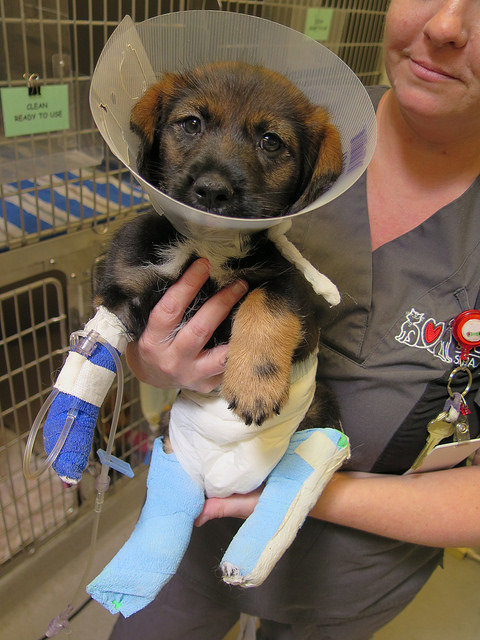
Shelters like the OHS are providing more veterinary care for pets like Angel.
Last week, I reported that I recently had the opportunity to hear Jim Tedford speak. Jim is the CEO of the Society of Animal Welfare Administrators — the premier group that brings together senior staff in humane societies, rescues, and municipal animal shelters. Jim spoke about the evolution of animal welfare and I thought it was bang-on. I thought you might like to hear about it.
Last week’s blog covered four trends: fewer incoming animals; “The rise of the rescue”; changing community expectations; and sources of companion animals. This week, I have four more trends that Jim identified to share with you.
Veterinary Care in Shelters
Historically, many shelters across North America struggled to provide even the basic care, such as vaccines. Where once spay/neuter surgeries delayed adoptions, dentistry is now the main reason for delays. Larger, progressive shelters like the OHS, are now performing blood work and diagnostics, fracture repairs, lump removals, amputation and other much more advanced care that would not have been possible in the past.
Funding Models
Overall, intake to shelters is falling across most of North America; costs, however, are not. In most cases they are increasing. “Quick turnaround” animals like young, small dogs are not being relinquished as quickly and the number of pit bulls and “blocky headed whatevers” is rising almost everywhere. Revenue from adoption fees is dropping. In a way, this is good news, because it means fewer animals need rehoming, but shelters are even more dependent upon donations than in the past. Some are opening their own for-profit veterinary clinics as a source of revenue. The OHS, though, has a policy of not competing against our community veterinarians.
Preserving the Bond
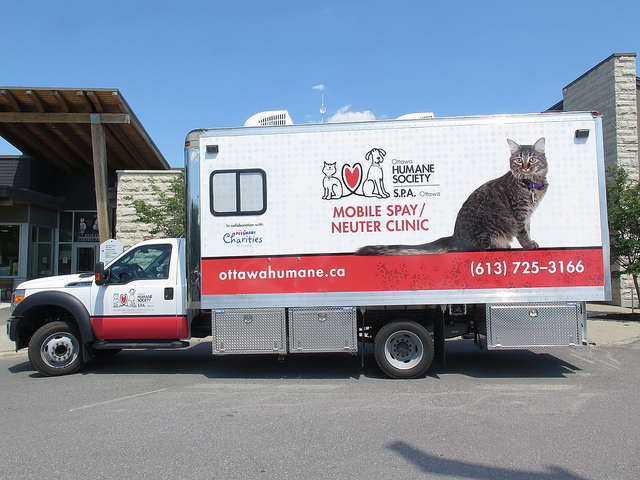
The OHS Mobile Spay/Neuter Clinic helps preserve the human animal bond in our community.
Increasingly, shelters are recognizing that sometimes the best shelter is the home the animal is already in. To support this, many are offering such services as behavioural support, assistance with veterinary costs, and food banks. Providing these supports can be scary prospect for any shelter struggling to provide for the animals already in its care. The OHS’s strategic plan calls for forays into this work, starting with our Mobile Spay Neuter Clinic.
Shelters and Veterinarians as Partners
There is tremendous opportunity for partnerships between veterinarians and shelters. Shelters need all the help they can get. Increasingly, veterinarians are coming to understand that shelters are sometimes their biggest clients and are a source of long-term business from adopters. Remember, shelters are now the number one source of companion animals! The OHS enjoys an excellent relationship with our veterinary community and, in turn, it is very supportive of our work.
The world of animal welfare has changed pretty dramatically, even since I entered it 18 years ago — thankfully, mostly for the better. There are a lot of reasons why animal welfare has improved, but assuredly one of them is that we are all talking more, listening more, and learning more from one another.
Bruce Roney
Executive Director
2023 Media Releases
Celebrity Cat Touring the Ottawa Humane Society (Dec. 14, 2023)
Pet Affordability Crisis — Ottawa Humane Society Eyes Ways to Help Even More Animals (Nov. 23, 2023)
Life-Saving Event for Ottawa’s Homeless Animals Happening Tonight (Nov. 3, 2023)
Halloween Family Fun at Ottawa Humane Society (Oct. 27, 2023)
More than 90 Cats Admitted to the Ottawa Humane Society (Oct. 17, 2023)
Dog Destroys Tens of Thousands of Dollars-Worth of Humane Society Equipment (Oct. 5, 2023)
Special Message from the Ottawa Humane Society: “Thanks for Wiggling and Waggling!” (Sept. 25, 2023)
Staying Ahead of the Curve: Ottawa Humane Society Taking Steps to Keep Families Together (Sept. 21, 2023)
Ottawa Humane Society Urges Pet Owners to Brace for a Hot Week (Sept. 1, 2023)
Putting People and Their Pets First: Ottawa Humane Society Planning the Organization’s Next Five Years (Aug. 24, 2023)
Ottawa’s Rabbit Crisis is at Critical Mass (July 24, 2023)
Keeping Pets Safe During the Hottest Days Ever (July 7, 2023)
Protecting Pets from Fireworks (June 30, 2023)
Puppy with Badly Broken Leg Recovering at Ottawa Humane Society (June 22, 2023)
$150 for a T-Shirt? Homeless Dogs in Desperate Need of Crates (June 16, 2023)
Smog Poses a Risk to Pets — Warns Ottawa Humane Society (June 6, 2023)
17 Rats Brought to Ottawa Humane Society on Long Weekend (May 25, 2023)
Rising Heat Poses a Danger to Ottawa’s Pets (May 10, 2023)
Ottawa Humane Society Eliminates Surrender Fees (April 13, 2023)
More Than 20 Big Dogs in Need of Foster Homes (March 17, 2023)
Ottawa Humane Society Launches Lottery to Support the Animals (March 7, 2023)
Ottawa Humane Society Seeking New Board Members (March 3, 2023)
More Than 40 Animals to be Spayed and Neutered at the Ottawa Humane Society (Feb. 24, 2023)
Ottawa Humane Society Warns Pet Owners to Take Caution During Cold Snap (Feb. 2, 2023)
Catching Up on Life-Changing Work
Last week, to celebrate World Spay Day, I had the honour of helping to provide spay/neuter surgeries to animals in the care of local rescue groups. Thanks to the incredible support from our community, at the OHS clinic, we spayed/neutered 34 cats, 3 dogs and 5 rabbits in need.
On top of the success of World Spay Day, I’m pleased to say the OHS has relaunched subsidized spay/neuter services for cats of low-income pet owners. We will start by working through a waitlist for the OHS Mobile Spay/Neuter Service that has been growing since the pandemic began.
By the end of March, we expect to spay/neuter up to 32 cats in need right here at our accredited veterinary clinic. In the spring, we are planning to roll out the Mobile Spay/Neuter Service into the community.
Spay/neuter is a crucial service for our pets as a pet that is spayed/neutered will usually live a longer, healthier life. Spaying/neutering your pet can also address common behaviour issues and make your pet less likely to roam.
Perhaps most important of all, spaying/neutering helps prevent pet overpopulation — reducing the number of homeless, unwanted animals in our community. This month is just the start of bringing back spay/neuter services to pet owners who need them most. We’ve got a lot of work to do to catch up with demand, but we look forward to resuming this service for a community in need.
Dr. Shelley Hutchings
OHS Chief Veterinarian
Another Welcome Return
There has been a very welcome sight outside our shelter the past week: our mobile spay/neuter vehicle. In preparation for rolling our Mobile Spay/Neuter Services out into the community, we have been engaging in a series of dry runs — sterilizing OHS animals for adoption, rather than owned pets. We want to make sure that everything runs smoothly and safely for both animals and staff.
Over the past two years, the OHS has provided sterilization services in the shelter clinic for our rescue partners from time-to-time, and of course we have continued to spay and neuter all OHS animals before adoption. Sadly, our Mobile Spay/Neuter Services had to be shelved during the pandemic. The close quarters and risk of COVID transmission simply made working on the vehicle too dangerous.
The popular program provides heavily subsidized sterilizations for cats of low-income Ottawa residents. We launched the program in 2016 as a part of our strategic plan to address cat overpopulation in our community. In its first four years, the program sterilized close to 6,000 cats. Without the program, estimates are that in just seven years, those cats and their offspring would have gone on to produce more than one million unwanted kittens.
As the pandemic slowly subsides, there have been many welcome reopenings in our community. Most programs here at the OHS have reopened or will shortly. For me, our Mobile Spay/Neuter Services is one of the most important as it reduces animal suffering for years to come.
Bruce Roney
President & CEO
A Good Day with HOPE
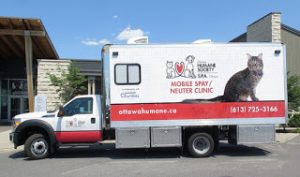
Ottawa’s first spay/neuter clinic on wheels!
The best day I have had in a long time was last Thursday. That was the launch of our new Mobile Spay/ Neuter Program. It was fantastic. Our board was there. Some of our most committed supporters were there. We were all happy and excited to be doing something positive for our community and for the animals. And to me, it meant the beginning of the end of the endless cycle of thousands of cats needing our care every year. It meant that we are starting to solve a problem, not just deal with it endlessly.
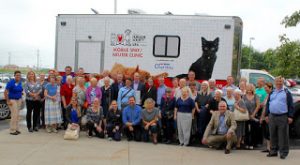
OHS supporters at the Mobile Spay/Neuter Clinic launch event.
One of the main themes of OHS’s five-year strategic plan is cat overpopulation: Too many cats will continue to live wretched lives, as long as there are too many cats. I believe this to the core. Finally, with this new program, we can reduce the number of cats in our community, and the number living wretched lives as a result. Studies suggest that in a community the size of Ottawa, 6,000 subsidized spay/neuters annually will result in a precipitous drop in overpopulation. By year two, the Mobile Spay/Neuter Clinic is targeting that magic 6,000!
The one damper on that great day was that I failed to thank one of our great community friends and partners: the wonderful folks at HOPE, who, for 34 years have been presenting the fantastic HOPE Volleyball Summerfest. This event, the largest of its kind, is possible only because a HUGE number of volunteers — a board of directors, a planning team of 40 and an astounding 1,100 event day volunteers — come together with only one thing in mind: giving to our community. And what gifts they have given! HOPE has given over $3.5 million dollars to 110 local charities since its inception 34 years ago.
Our friends at HOPE are giving the OHS $25,000 this year to help make this ambitious new program a success, and to make a difference for many generations of cats. They deserve my thanks and yours. Please join me in thanking all the great people at HOPE for their 34-year commitment to our community.
Bruce Roney
Executive Director
Our Ten Year Challenge
There has been a small phenomenon going around the internet lately: the ten year challenge. The idea is that you post a picture of yourself today and from ten years ago. Notwithstanding Wired Magazine’s theory that the trend was started for the express purpose of calibrating facial recognition software, the idea is kind of fun. It certainly got me thinking about where I was and where the OHS was ten years ago.
2009: The OHS is still residing in a fairly decrepit and definitely inadequate building on Champagne Avenue. The space was designed to accommodate only about a third of the animals that we cared for in 2009.
2019: After seven years, we are fully settled into our West Hunt Club Shelter. The additional space and amenities have allowed the OHS to not only vastly improve animal care but also to develop numerous new programs for animals and for our community: day camps for children and youth, seminars, obedience classes, tours and open-houses, a pet loss support group, workshops for newcomers to Canada, and many other initiatives are now launched, all made possible by the new location and the generosity of our donors.
2009: While an OHS internal clinic assures that all animals adopted out by the OHS are spayed or neutered prior to adoption, the range of medical intervention possible is restricted by our limited space and resources. The OHS offers no medical intervention to the community.
2019: A larger, better equipped clinic allows the OHS to address more complex medical issues, and bring more sick and injured animals to health and forever homes. The OHS has been offering its Mobile Spay Neuter Clinic for three years, offering subsidized sterilization for the pets of low-income people across Ottawa.
2009: While our community clearly loves animals, not everyone knows or is sensitive to the right thing to do for them. The numbers of cats at large is rampant.
2019: In part because of our sterilization, education and outreach programs, fewer cats are at large and fewer are admitted to the OHS. Shelters and other animal welfare groups are now the number one source of pets all across North America.
So, while I may be even greyer than I was ten years ago, and the bags under my eyes have become more pronounced with the passage of time, I think the OHS has blossomed, and the animals along with our whole community have benefited.
Bruce Roney
President and CEO


